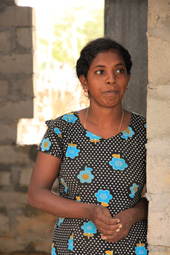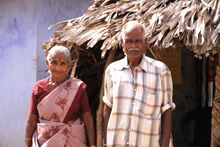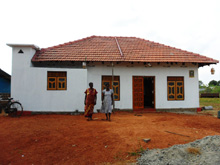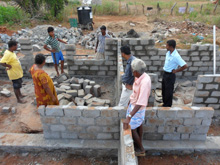Reconstruction of Three Thousand War Damaged Houses Under Way in Northern Sri Lanka with Funding From the European Union, Australian Government and the Swiss Agency for Development Cooperation
Reconstruction of Three Thousand War Damaged Houses Under Way in Northern Sri Lanka with Funding From the European Union, Australian Government and the Swiss Agency for Development Cooperation
 22 February 2012, Colombo, Sri Lanka: A partnership between the European Union, the Australian Government, the Swiss Agency for Development Cooperation (SDC) and the United Nations Human Settlements Programme (UN-Habitat), is supporting the reconstruction and repair of over 4,600 conflict damaged houses in Sri Lanka’s Northern Province. The Government of Sri Lanka is supporting this initiative through the identification of priority community needs in the project locations.
22 February 2012, Colombo, Sri Lanka: A partnership between the European Union, the Australian Government, the Swiss Agency for Development Cooperation (SDC) and the United Nations Human Settlements Programme (UN-Habitat), is supporting the reconstruction and repair of over 4,600 conflict damaged houses in Sri Lanka’s Northern Province. The Government of Sri Lanka is supporting this initiative through the identification of priority community needs in the project locations.
Commencing in January 2011, the “Support to Conflict Affected People through Housing” Project has to-date assisted over 3,000 IDP families in their reconstruction and repair efforts in the districts of Vavuniya, Mullaitivu, Killinochchi and Mannar. Approximately 4,600 families from 60 villages will be supported through this permanent housing initiative over a period of two and a half years. It is estimated that more than 16,000 people will benefit directly through this European Union, Australian Government and SDC funded project. There is also a strong focus on provision of construction skills training for 100 youths in the affected villages, with plans to increase to 300, thereby enhancing livelihood opportunities and supporting the re-establishment of the local economy.
 Over a period spanning three decades, Sri Lanka experienced a civil war that affected the lives and destroyed the assets of hundreds of thousands of civilians. According to estimates, when the conflict ended in May 2009, over 160,000 houses had been damaged or destroyed and over 300,000 people displaced. Recognizing the urgent need to facilitate the dignified return of displaced families, UN-Habitat initiated several permanent housing projects in partnership with funding partners and this European Union, Australian Government and SDC support has proved critically important.
Over a period spanning three decades, Sri Lanka experienced a civil war that affected the lives and destroyed the assets of hundreds of thousands of civilians. According to estimates, when the conflict ended in May 2009, over 160,000 houses had been damaged or destroyed and over 300,000 people displaced. Recognizing the urgent need to facilitate the dignified return of displaced families, UN-Habitat initiated several permanent housing projects in partnership with funding partners and this European Union, Australian Government and SDC support has proved critically important.
The current housing recovery project, with an investment of US$ 23 Million (SLRS. 2.5 Billion) is primarily funded by the European Union (SLRS. 1.8 Billion) with significant co-funding from the Australian Government and SDC. UN-Habitat and SDC are jointly implementing the project by providing technical support to home owners.
Using a ’home owner driven’ approach, this project is currently assisting families to actively take charge of their own recovery. The families are responsible for the planning, implementation and monitoring of their own progress, while vital technical assistance including house plan designs, selection of skilled labour for construction, purchase of good quality building materials and support in solving land tenure issues is provided by UN-Habitat and SDC. The families selected under this EU/AusAID/SDC/UN-Habitat initiative are contributing their own labour towards the reconstruction effort. Building materials are being procured locally, whenever possible, which is helping to revive local economies in the project locations. Communities are also being assisted to manufacture their own building materials, such as concrete blocks, through the provision of block making moulds and training by the field technical teams.
 Mrs. Raskruban Yogamalar, a project beneficiary from Kanagrayankulam District Secretariat Division in the Vavuniya district said “We are extremely happy to be part of this housing project and really appreciate the support from these foreign donors. Since we had the freedom to build our own house, we used good quality materials and selected a house plan of our choice. My family was closely involved in the construction process. We provided our own labour towards the foundation work. We have also manufactured our own concrete blocks. Our ultimate aim was to build a secure home where my family can live peacefully. We hope this initiative will continue to help conflict affected people who need assistance with permanent housing”. Yogamalar’s house is now complete and the family is looking forward to moving in to their new home soon.
Mrs. Raskruban Yogamalar, a project beneficiary from Kanagrayankulam District Secretariat Division in the Vavuniya district said “We are extremely happy to be part of this housing project and really appreciate the support from these foreign donors. Since we had the freedom to build our own house, we used good quality materials and selected a house plan of our choice. My family was closely involved in the construction process. We provided our own labour towards the foundation work. We have also manufactured our own concrete blocks. Our ultimate aim was to build a secure home where my family can live peacefully. We hope this initiative will continue to help conflict affected people who need assistance with permanent housing”. Yogamalar’s house is now complete and the family is looking forward to moving in to their new home soon.
 To-date, 1,084 vulnerable families have been assisted to undertake major repairs to their houses, while 1,988 families are receiving support to completely rebuild their houses. This includes 100 families in Vavuniya, 1,264 families in Mullaitivu, and 1,708 families in Killinochchi. The activities in Mannar district are scheduled to commence in early 2012. Vulnerable families such as female-headed households, elderly home owners and families with disabled family members are given special attention and support by the technical field teams. The role of women is heavily promoted in all aspects of the project and particularly in decision making and financial control where women account for 40% of those in leadership roles. Another key feature of the project is the support provided by Village Rehabilitation Committees (VRCs) towards monitoring the project progress and assistance to vulnerable families. This includes bulk purchase of building materials through community bargaining and advice and assistance in construction activities.
To-date, 1,084 vulnerable families have been assisted to undertake major repairs to their houses, while 1,988 families are receiving support to completely rebuild their houses. This includes 100 families in Vavuniya, 1,264 families in Mullaitivu, and 1,708 families in Killinochchi. The activities in Mannar district are scheduled to commence in early 2012. Vulnerable families such as female-headed households, elderly home owners and families with disabled family members are given special attention and support by the technical field teams. The role of women is heavily promoted in all aspects of the project and particularly in decision making and financial control where women account for 40% of those in leadership roles. Another key feature of the project is the support provided by Village Rehabilitation Committees (VRCs) towards monitoring the project progress and assistance to vulnerable families. This includes bulk purchase of building materials through community bargaining and advice and assistance in construction activities.
This unique partnership between the EU, AusAID, SDC and UN-Habitat is helping thousands of families in the North to fulfill their needs and expectations whilst ensuring a sense of ownership through a fully participatory process with the people. It is also an excellent example of coordination and strategic thinking and aid effectiveness between donors. This housing initiative will further enhance the resettlement efforts of the Government of Sri Lanka in the Northern Province.
